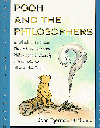 Visit the official Winnie-the-Pooh website by clicking the picture above. |
Pooh and the Philosophers, by John Tyerman Williams, Dutton, 1995. |
The central thesis of Pooh and the Philosophers is that ALL of Western Philosophy is a preamble (or in the case of some existentialists, a footnote to) Winnie-the-Pooh. While this concept is an obvious one, it is worth pointing out. Williams relates Greek, British Empiricist, Rationalist, Existentialist, and other philosophies to the ideas presented by the 'Great Bear' (as Pooh is sometimes refered to in this book) and his cast of friends.
While I highly recommened this book to anyone who is a Pooh fan or a fan of Philosophy (of course their is no distinction between these two groups), I would like to point out a few things that might have improved the book. In the Greek Philosophy section, John Tyerman Williams neglected to analyze scepticism or epicureanism. Surely a highly intelligent being like Winnie-the-Pooh would have shed some light on these two movements in late Hellenistic Philosophy. Another minor infraction is the treatment of Descartes. Williams suggests that the Great Bear would have poo-pooed Cartesian Philosophy. Surely Pooh would have seen some value in Descartes. After all, the Great Bear seems to exemplify Descartes saying -- Cogito ergo sum -- I think therefore I am.
These comments should be seen as consturctive crtiticism and in no way disparages the value of this book. Perhaps this book will bring about the kind of attitude among scholars that their predecessors had in the Middle Ages and the Renaissance. During the Middle Ages and the Renaissance, the great philosopher Aristotle was recoginized to be of such intellectual stature that he was simply refered to as the 'Philosopher.' If one wanted to prove something, he/she simply needed to say that it was from the 'Philosopher.' Perhaps we will now prove our ideas by drawing on the authority of the delightful creature known as Winnie-the-Pooh. In the future, scholars will need only say 'Pooh' in order to achieve a high degree of respect for their intellectual endeavors.
What is the difference between Nietzsche and Kant? What is concursus Dei? What is the relationship between determinism and probability? What can one do with a degree in philosophy? This book answers at least three out of the four questions.
The Cambridge Dictionary of Philosophy is a useful and illuminating book: whether you are an expert in philosophy, a novice who like to sit around and impress passersby, and even those who think that what they do has nothing to do with philosophy. Why? Unlike many books on philosophy, this book delves into a wide range of areas: from what we normally think of as philosophy and what we normally don't. For example, it has a lot of sections that deal with computer science, economics (and other social sciences), physics, mathematics, literary theory, art, and a lot of other fields that we normally don't see as being philosophical (of course, many of these fields were once a part of philosophy and still have many issues within the respective fields that can be looked upon in a philosophical way).
For you philosophers out there, there are plenty of things in the book for you as well. The article on Nietzsche was very thought-provoking -- he isn't portrayed as an absolute nihilist. The article on Sartre was very good. There were a few glitches -- e.g., the article on "phenomenology" refused to give a clear definition for it (!). However, overall, it was good.
I know that I have found this book useful -- again something not normally thought of in association with philosophy. Anyone who wishes to be associated with intellegensia -- presuming it is safe to be that in your neck of the woods -- will want to run out and buy this wonderful book. On the other hand my description of the book might be a Cambridge property, in which case, it might not be as genuine a feeling for you as it is for me.
 -- Click arrow to go back to the previous topic: Review of Science (other than Chaos).
-- Click arrow to go back to the previous topic: Review of Science (other than Chaos).
 -- Click arrow to go to next section: Review of Economics, Management, Strategy, Finance, and Business.
-- Click arrow to go to next section: Review of Economics, Management, Strategy, Finance, and Business.